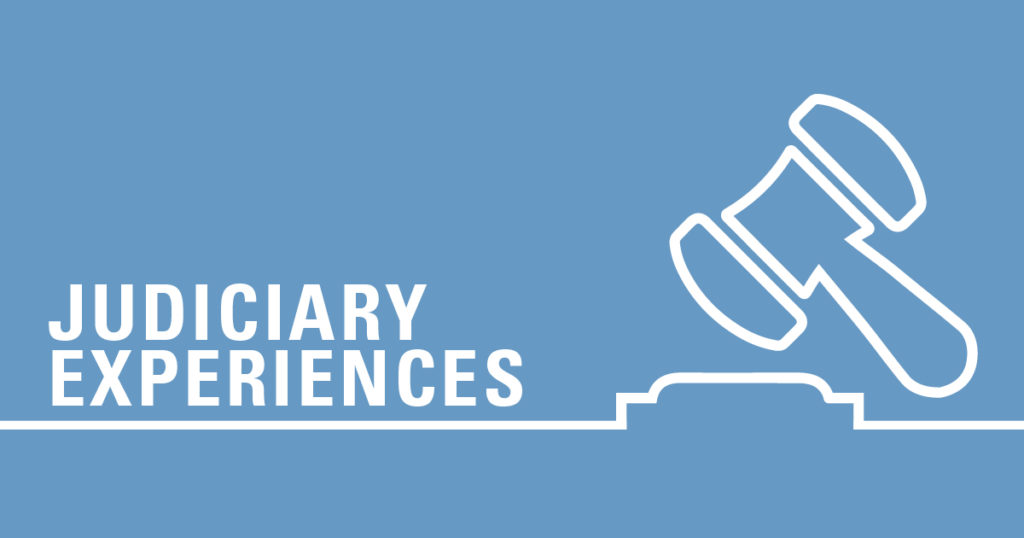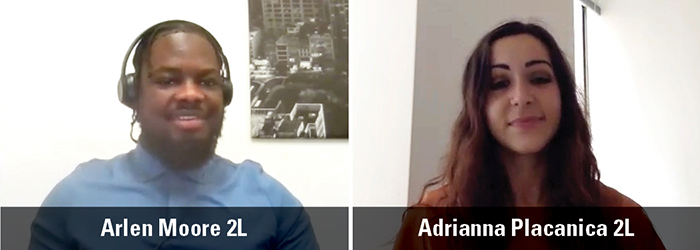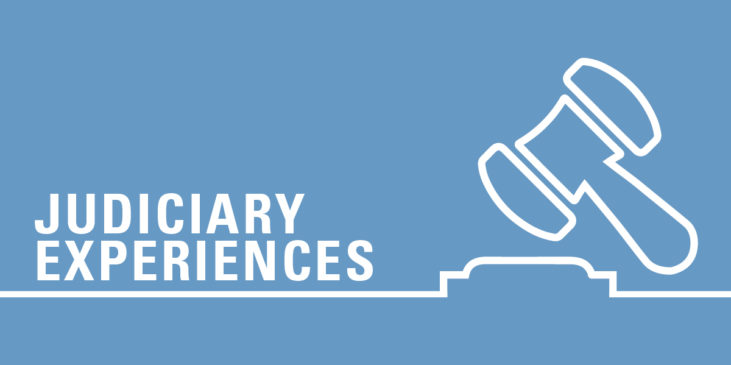
The judiciary’s role as an essential system for upholding the rule of law and administering justice touches every aspect of the legal profession, and understanding how the courts function is a critical component of students’ legal education. At New York Law School, students have exceptional opportunities to work with judges in one of the many courthouses near campus or in surrounding jurisdictions to refine their legal skills, gain exposure to courtroom advocacy, and understand how judicial decisions are made.
NYLS Student Experiences

In virtual interviews, Arlen Moore 2L and Adrianna Placanica 2L spoke about their recent experiences during judicial internships.
Last year, remote work during the pandemic presented new challenges for law students searching for summer internships. When Moore received a message from NYLS’s Black Law Students Association (BLSA) about a judicial internship opportunity, he leapt at the chance to apply. He was accepted and, during the summer of 2021, Moore worked as an intern for Judge Suzanne Adams in the First Judicial District, Supreme Court, Civil Branch, New York County.
It was a valuable learning experience. As Moore notes, “I got hands-on training to further develop my legal skills and more insight into the way the court system functions. I also worked closely with law clerks and practicing lawyers, who provided me with constructive feedback that benefits my professional development.”
During the internship, he worked on civil matters such as personal injury cases, observed trials and the meetings between the judge and the parties involved, and gained experience handling summary judgments. It gave him a new perspective on practicing law.
For Placanica, working as a summer intern for Judge Claire Kelly in the United States Court of International Trade was a meaningful opportunity to gain practical experience in international law. She entered NYLS knowing she had a strong interest in the field, but was looking to narrow her focus.
“Every person who worked at the court was nice and welcoming, and they made sure I had a fruitful summer. Working with the law clerks, analyzing dockets, and helping research and prepare materials for the judge gave me better insight into what judges are looking for. I was also given the opportunity to work with Judge Kelly on an opinion, drafting an explanation of the facts in terms of the law and the research for a portion of the case. I was proud to be able to contribute in a purposeful way.”
While Placanica continues to explore other areas of international law at NYLS, the internship provided her with a better perspective on pursuing a legal career in international trade.
What Judges Expect
With key differences between federal and state courts, and trial and appellate courts, each judge will bring something unique to students’ legal experience.
Judge Leo M. Gordon is a Senior Judge of the United States Court of International Trade and an adjunct professor at NYLS, co-teaching a class on international trade law. He explains that, when working with interns in his chambers, his goal is to give them a dose of the real world, assigning them relevant work that helps them learn to analyze arguments, understand tone and approach, and get to know what it’s like on the judges’ side of the table.
For law students applying for internships or externships, Judge Gordon recommends that they read opinions of the judges they aspire to work with to try to understand their mindset, tone, and approach. Determining what they can bring to the table will make the experience more meaningful for them and beneficial for the judge.
Judge (Ret.) Marc Whiten ’84, who served 12 years on the bench on criminal and supreme courts, believes that it’s beneficial for law students to see what happens in chambers and see how decisions are made. He made sure that interns were included in every step of the plea negotiations, pretrial, and trial processes and left with tangible work experience they could use in their future legal careers.
Judge Whiten has continued to work with students at NYLS, teaching classes and working with the Office of Academic Planning and Career Development because he says that “NYLS students I’ve worked with come to the job with an open mind, eager to learn and make the most of their experience. They come to the courtroom ready to work hard and make a difference. Their excitement and openness continue to inspire me.”
NYLS Judiciary Programs
After completing their first year of law school, students seeking to gain more judiciary experience can apply for NYLS’s Judicial Externship Program to work with a federal judge or a state court judge in New York City.
The Office of Academic Planning and Career Development also works with students year-round, helping them with the application process and preparation for judicial internships and externships as well as postgraduate clerkships.

